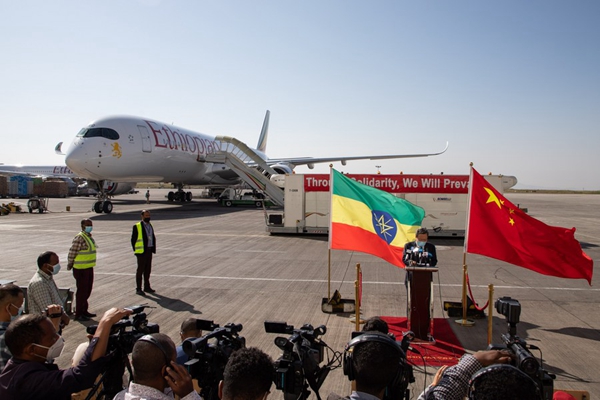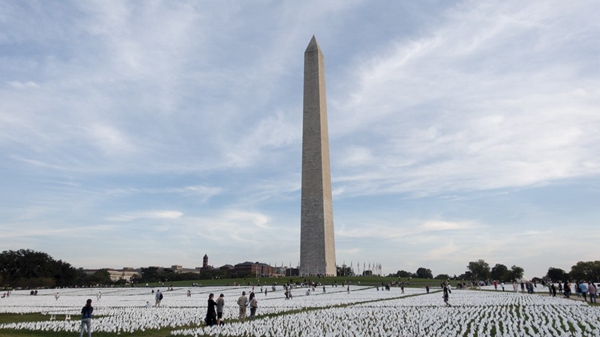Global solidarity urgently needed as COVID death toll tops 5M
 0 Comment(s)
0 Comment(s) Print
Print E-mail Xinhua, November 2, 2021
E-mail Xinhua, November 2, 2021

The global COVID-19 death toll exceeded 5 million on Monday, less than four months after reaching the 4-million mark, once again sounding the alarm about the grave threat still posed by the pandemic.
After nearly two years, the war against the lethal pathogen has entered a nasty stalemate, with humanity trying to sharpen its weapon of immunity while the virus quickly evolves to dodge it.
To maintain an edge over the cunning enemy, the international community must ensure vaccine equity and strengthen global cooperation.
Grim figures
According to data from Johns Hopkins University, the United States remains the worst-hit country with about 46 million cases and about 746,000 deaths, accounting for more than 18 percent of the global caseload and nearly 15 percent of the global death toll.
Brazil recorded the world's second-highest death toll, at about 608,000, followed by India with about 458,000 deaths.
The COVID-19 pandemic situation in Europe is worsening as another winter approaches. It is the only region with increases in infections across all age groups, while five over regions have reported a decline last week, according to the World Health Organization.
Russia has registered 40,402 COVID-19 infections over the past 24 hours, taking the national tally to 8,554,192, the official monitoring and response center said Monday.
Meanwhile, the situation in some Asian and African countries remains worrisome.
For example, Mongolia has seen a resurgence of COVID-19 due to the highly contagious Delta variant, although 65.8 percent of its population have received two doses of COVID-19 vaccines.
The number of confirmed COVID-19 cases in Africa reached 8,494,634 as of Sunday afternoon, the Africa Centers for Disease Control and Prevention said.
Compounded situation
Currently, many parts of the world are grappling with severe resurgences of the pandemic mainly fuelled by the more contagious variants of COVID-19, including the Delta variant.
Vaccines are still widely considered a powerful weapon against the virus. Countries around the world have been accelerating their vaccination campaigns to cover more age groups, and some have already begun to offer their citizens booster doses to consolidate the gains on the battlefield.
However, the astoundingly-unbalanced vaccine rollout worldwide has eroded global efforts to curb the spread of the virus.
In an earlier news release, the WHO described the current situation as "a two-track pandemic" because "people in poorer countries continue to be at risk while those in richer countries with high vaccination rates enjoy much greater protection."
Just five of Africa's 54 nations are projected to hit the year-end target of fully vaccinating 40 percent of their people, said the WHO on Thursday.

At the current pace, Africa still faces a 275 million shortfall of COVID-19 vaccines against the year-end target of fully vaccinating 40 percent of its people.
Africa has fully vaccinated 77 million people, just 6 percent of its population, while over 70 percent of high-income countries have already vaccinated more than 40 percent of their people.
Meanwhile, facing unprecedented downward economic pressures and people's growing aspirations for a return to normalcy, governments are easing or have totally lifted restrictions, giving the virus a chance to stage a comeback.
Ugandan President Yoweri Museveni on Thursday said the country would fully reopen its economy in January next year irrespective of the number of people vaccinated against COVID-19.
Coronavirus restrictions in the Australian capital of Canberra have eased significantly as residents of the Australian Capital Territory are no longer required to wear face masks outdoors from Friday.
For the first time since early August, Canberra's arts and entertainment venues including cinemas and theaters have reopened for up to 75 percent of their seating capacity.
The irresponsible handling of the pandemic by some Western countries, including politicizing the virus' origins, have also compounded the situation.
Urgent calls
Five million deaths should be tragic enough to spur the world into action, particularly in the developing world. Effective measures to support developing countries are needed to reach a turning point in the global pandemic fight.
The United Nations on Thursday called for global solidarity for Africa to support its COVID-19 response.
"We need to prioritize our response to the COVID-19 pandemic in Africa through accelerated vaccine distribution, strengthening national health systems and much-needed investments in preparedness," UN Deputy Secretary-General Amina Mohammed said.
Kristalina Georgieva, managing director of the International Monetary Fund (IMF), on Wednesday urged the Group of 20 economies to take bold action to end the COVID-19 pandemic and secure a global economic recovery.
"The IMF recently reduced its global growth forecast to 5.9 percent for this year. The outlook is highly uncertain, and downside risks dominate," Georgieva said in a blog post, adding the global recovery is held back especially by new virus variants and the ensuing economic impact, as well as supply-chain disruptions.
"The pandemic remains the biggest risk to economic health, and its impact is made worse by unequal access to vaccines and large disparities in fiscal firepower," Georgieva said, noting that too many developing countries are desperately short of both vaccines and resources to support their recoveries.
In this regard, China has set a good example. After the pandemic broke out, it sent expert teams to several developing countries, supplied them with the most-needed medical materials, and made its vaccines a global public good.
To date, China has provided over 1.6 billion doses of vaccines to more than 100 countries and international organizations, and will provide over two billion doses to the world in the course of this year. China is conducting joint vaccine production with 16 countries, with an initial capacity of 700 million doses per year.
"China's support has been a mainstay in getting us out of this pandemic. Without China's support, we definitely wouldn't have been able to do it, not just because of the quantity of vaccines (supplied) but also because of their speedy delivery," Ecuadorian Public Health Minister Ximena Garzon said.
China's cooperation with El Salvador in the health sector has been fundamental to combating the COVID-19 epidemic in the Central American country, Salvadoran Health Minister Francisco Alabi said.
Amid the pandemic, China has acted in a timely manner with altruism and a sense of solidarity for the benefit of the entire world, sharing not only biological resources but also "measures and recommendations for the management of the pandemic," said Alabi.






Go to Forum >>0 Comment(s)